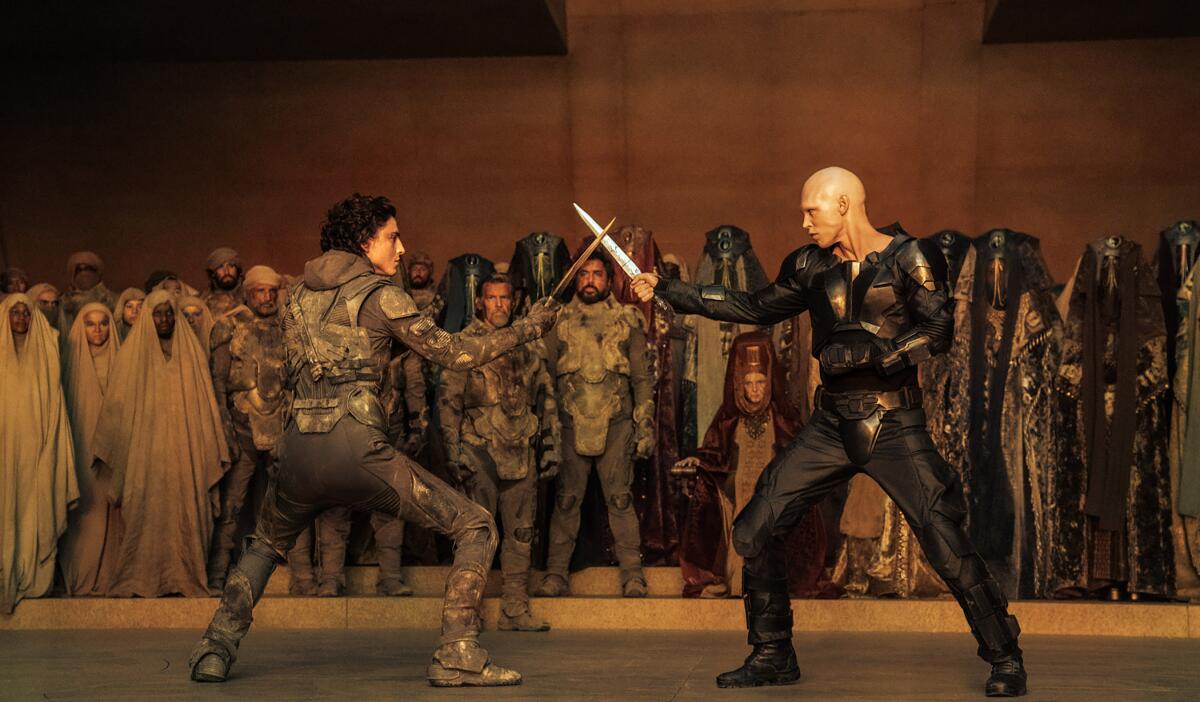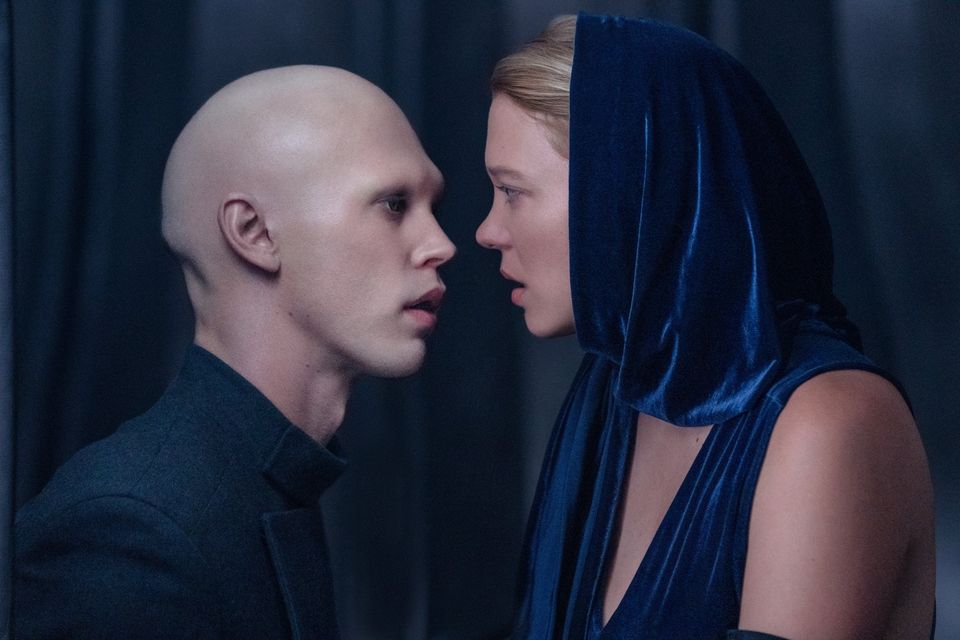Dune: Part 2 review - sombre space opera | reviews, news & interviews
Dune: Part 2 review - sombre space opera
Dune: Part 2 review - sombre space opera
A timely Sixties sci-fi classic realised with poetic spectacle and grim irony

Dennis Villeneuve’s Dune sequel is a sombre science-fiction spectacle that insists on the scale of cinema: erupting sandworms are Cecil B. DeMille colossal, the sound design centred on Hans Zimmer’s score thunderously enveloping. In a genre once jokingly called space opera, its grand aristocratic dynasties and passions justify the term.
It also treats its 1965 Frank Herbert source as a classic novel, teasing out abiding themes from its proto-hippie era. Vietnam-style aerial gunships hover, and atomic warfare, religious faith and extremism, ecology and colonialism give the narrative sinew.
We last saw boyish hero Paul Atreides (Timothée Chalamet) and his ferociously loyal mother Lady Jessica (Rebecca Ferguson) on the desert planet Arrakis, in the company of its indigenous, Bedouin-like nomad warriors the Fremen. The house of Atreides has been otherwise massacred in a sneak attack by the forces of slug-like, bloated Baron Vladimir Harkonnen (Stellan Skarsgård), with the secret blessing of Emperor Shaddam (Christopher Walken). Arrakis is the source of the Spice trade the Empire relies on, now mined by the Harkonnens under threat from mammoth sandworms and Fremen guerillas.
 Paul riding a sandworm deserves a giant screen for its roaring sound and vision, and he’s accepted by some Fremen as a promised messiah, a faith Jessica cynically encourages with her own new psychic powers. Paul and his Fremen beloved Chani (Zendaya) meanwhile waltz in the dunes at dusk like Astaire and Rogers, but nightmare visions of holy war slaughter in his name make Paul resist his calling, till it consumes him.
Paul riding a sandworm deserves a giant screen for its roaring sound and vision, and he’s accepted by some Fremen as a promised messiah, a faith Jessica cynically encourages with her own new psychic powers. Paul and his Fremen beloved Chani (Zendaya) meanwhile waltz in the dunes at dusk like Astaire and Rogers, but nightmare visions of holy war slaughter in his name make Paul resist his calling, till it consumes him.
Javier Bardem ekes rare humour from his Fremen leader Stilgar’s credulous faith in this kid messiah. Levity isn’t, though, Villeneuve’s gig. From the punishing child kidnap hit Prisoners (2013) to the philosophical, moving sf of Arrival (2016) and Blade Runner 2049 (2017), he increasingly rivals Christopher Nolan in serious ideas at epic scale. His imagery has more fluid poetry than Nolan’s sometimes clunky grandeur, and there’s a sense here of moving through shifting dunes on a planet where all is dust, bar bone-white caverns where ice-blue liquids transmute souls. Haddoken colonists meanwhile deploy squat, gun-metal black, Gigeresque machines. Tight close-ups of actors filmed in the fabled magic hour add warmly human elements to the digital splendour and intricate, thrusting narrative.
 Elsewhere, the Emperor’s daughter Princess Irulan (Florence Pugh) plots her own survival, and Charlotte Rampling’s Reverend Mother pits her machinations against Jessica’s, each ruthlessly deploying acolytes resembling Christians and Muslims. This Dune’s female balance includes Zendaya’s rough-edged Fremen heroine and Lea Séydoux’s Lady Margot, effortless seductress of new villain Feyd-Rautha Harkonnen (Elvis’s unrecognisable Austin Butler, pictured above left with Seydoux), a psychopathic pawn in bigger games. Seen together, Séydoux and Butler could be Eros and Thanatos.
Elsewhere, the Emperor’s daughter Princess Irulan (Florence Pugh) plots her own survival, and Charlotte Rampling’s Reverend Mother pits her machinations against Jessica’s, each ruthlessly deploying acolytes resembling Christians and Muslims. This Dune’s female balance includes Zendaya’s rough-edged Fremen heroine and Lea Séydoux’s Lady Margot, effortless seductress of new villain Feyd-Rautha Harkonnen (Elvis’s unrecognisable Austin Butler, pictured above left with Seydoux), a psychopathic pawn in bigger games. Seen together, Séydoux and Butler could be Eros and Thanatos.
Only Peter Jackson’s The Lord of the Rings compares as a saga, and at 5½ hours to date (more is planned), Dune has the virtue of relative brevity – a climactic battle Jackson would wallow in is swiftly tactical here. You can debate Villeneuve’s po-faced, unfashionably reverent attitude, and mourn Jodorowsky’s madly impossible, abandoned Seventies Dune dream (David Lynch’s 1984 version meanwhile remains serviceably strange).
This Dune doesn’t lodge long in the heart. Villeneuve has though built a remarkable world filled with timely ideas. Prophecy devastatingly shadows pageantry, in the grimly triumphal end.
rating
Explore topics
Share this article
The future of Arts Journalism
You can stop theartsdesk.com closing!
We urgently need financing to survive. Our fundraising drive has thus far raised £49,000 but we need to reach £100,000 or we will be forced to close. Please contribute here: https://gofund.me/c3f6033d
And if you can forward this information to anyone who might assist, we’d be grateful.

Subscribe to theartsdesk.com
Thank you for continuing to read our work on theartsdesk.com. For unlimited access to every article in its entirety, including our archive of more than 15,000 pieces, we're asking for £5 per month or £40 per year. We feel it's a very good deal, and hope you do too.
To take a subscription now simply click here.
And if you're looking for that extra gift for a friend or family member, why not treat them to a theartsdesk.com gift subscription?
more Film
 Bugonia review - Yorgos Lanthimos on aliens, bees and conspiracy theories
Emma Stone and Jesse Plemons excel in a marvellously deranged black comedy
Bugonia review - Yorgos Lanthimos on aliens, bees and conspiracy theories
Emma Stone and Jesse Plemons excel in a marvellously deranged black comedy
 theartsdesk Q&A: director Kelly Reichardt on 'The Mastermind' and reliving the 1970s
The independent filmmaker discusses her intimate heist movie
theartsdesk Q&A: director Kelly Reichardt on 'The Mastermind' and reliving the 1970s
The independent filmmaker discusses her intimate heist movie
 Blu-ray: Wendy and Lucy
Down-and-out in rural Oregon: Kelly Reichardt's third feature packs a huge punch
Blu-ray: Wendy and Lucy
Down-and-out in rural Oregon: Kelly Reichardt's third feature packs a huge punch
 The Mastermind review - another slim but nourishing slice of Americana from Kelly Reichardt
Josh O'Connor is perfect casting as a cocky middle-class American adrift in the 1970s
The Mastermind review - another slim but nourishing slice of Americana from Kelly Reichardt
Josh O'Connor is perfect casting as a cocky middle-class American adrift in the 1970s
 Springsteen: Deliver Me From Nowhere review - the story of the Boss who isn't boss of his own head
A brooding trip on the Bruce Springsteen highway of hard knocks
Springsteen: Deliver Me From Nowhere review - the story of the Boss who isn't boss of his own head
A brooding trip on the Bruce Springsteen highway of hard knocks
 The Perfect Neighbor, Netflix review - Florida found-footage documentary is a harrowing watch
Sundance winner chronicles a death that should have been prevented
The Perfect Neighbor, Netflix review - Florida found-footage documentary is a harrowing watch
Sundance winner chronicles a death that should have been prevented
 Blu-ray: Le Quai des Brumes
Love twinkles in the gloom of Marcel Carné’s fogbound French poetic realist classic
Blu-ray: Le Quai des Brumes
Love twinkles in the gloom of Marcel Carné’s fogbound French poetic realist classic
 Frankenstein review - the Prometheus of the charnel house
Guillermo del Toro is fitfully inspired, but often lost in long-held ambitions
Frankenstein review - the Prometheus of the charnel house
Guillermo del Toro is fitfully inspired, but often lost in long-held ambitions
 London Film Festival 2025 - a Korean masterclass in black comedy and a Camus classic effectively realised
New films from Park Chan-wook, Gianfranco Rosi, François Ozon, Ildikó Enyedi and more
London Film Festival 2025 - a Korean masterclass in black comedy and a Camus classic effectively realised
New films from Park Chan-wook, Gianfranco Rosi, François Ozon, Ildikó Enyedi and more
 After the Hunt review - muddled #MeToo provocation
Julia Roberts excels despite misfiring drama
After the Hunt review - muddled #MeToo provocation
Julia Roberts excels despite misfiring drama
 Ballad of a Small Player review - Colin Farrell's all in as a gambler down on his luck
Conclave director Edward Berger swaps the Vatican for Asia's sin city
Ballad of a Small Player review - Colin Farrell's all in as a gambler down on his luck
Conclave director Edward Berger swaps the Vatican for Asia's sin city
 London Film Festival 2025 - Bradley Cooper channels John Bishop, the Boss goes to Nebraska, and a French pandemic
... not to mention Kristen Stewart's directing debut and a punchy prison drama
London Film Festival 2025 - Bradley Cooper channels John Bishop, the Boss goes to Nebraska, and a French pandemic
... not to mention Kristen Stewart's directing debut and a punchy prison drama

Add comment